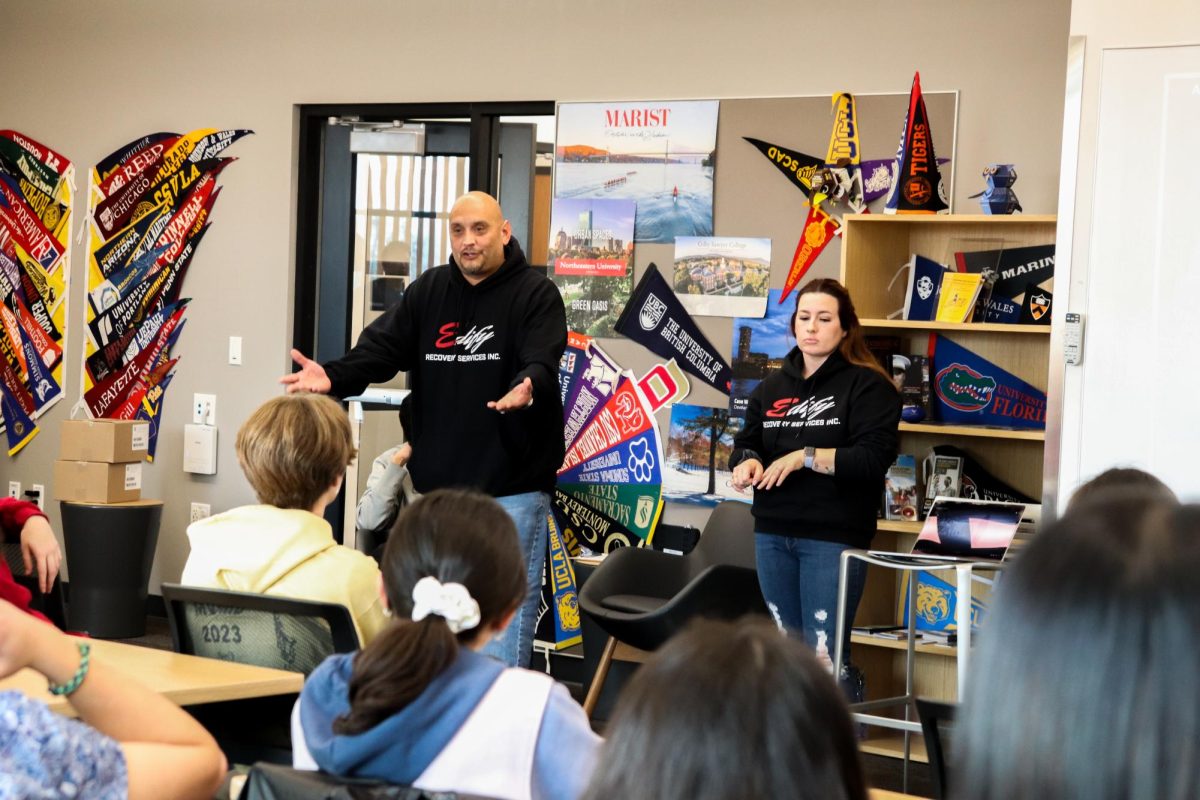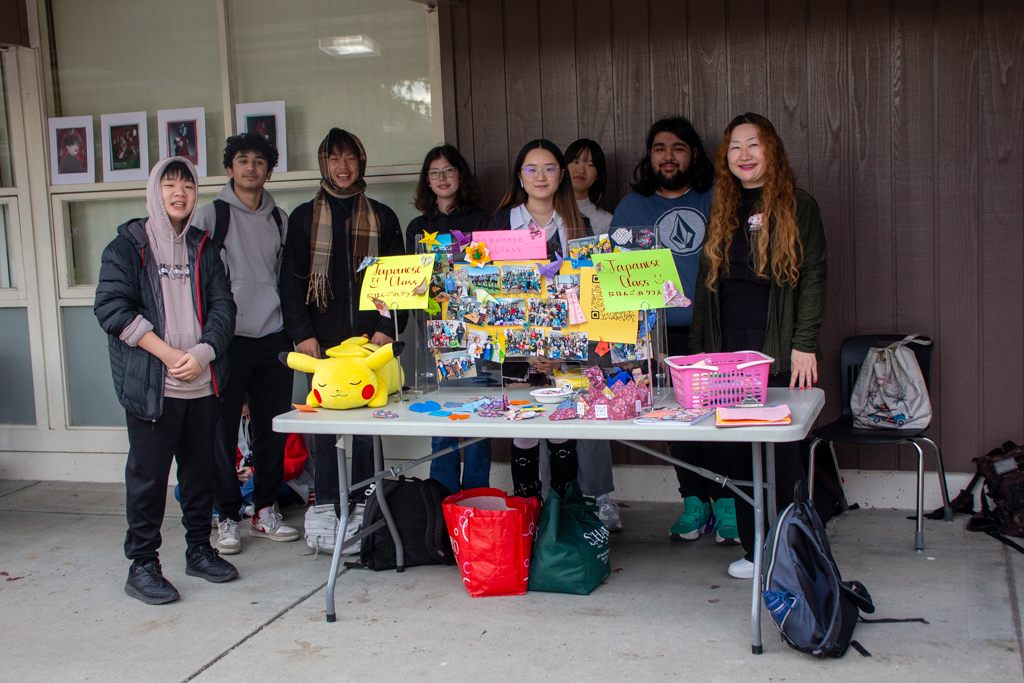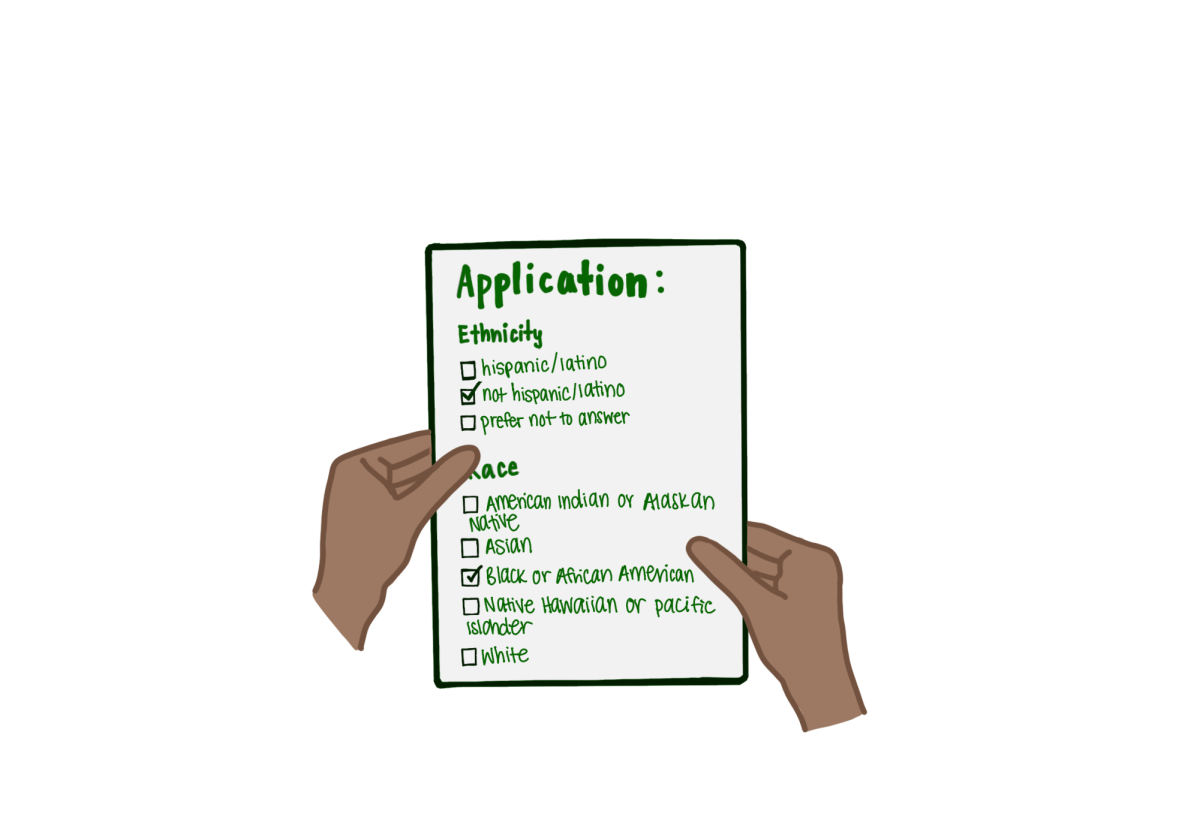The MVHS Wellness Committee, a component of the ASB Activities class, spearheaded its first speaker event on Tuesday, Nov. 15 in the theater. Gunn High School teacher Ronen Habib and Stanford psychology graduate student Kari Leibowitz spoke to students and parents about happiness and stress.
Habib teaches positive psychology at Gunn High School and is the founder of EQ Schools, a company that brings mindfulness, emotional intelligence, and positive psychology teaching to students and educators.
“Three years into my teaching career, and I felt really burned out. I felt that many kids were studying for the grades, not for studying or for learning’s sake. I had some really intense conversations with parents in Palo Alto and it was hard. I began to kind of lose touch with the kids that I was teaching, and one day, I had a wakeup call,” Habib said.
This wakeup call came in the form of a 7am staff meeting in the Gunn High School auditorium, where teachers were notified that a student had committed suicide earlier that morning. The student, Habib quickly realized, was one of his own. After Habib spoke at the student’s funeral, he made a personal vow to be more consciously aware of his students’ emotional health and well-being, he said.
The vast majority of us go about life mindlessly. We eat mindlessly, drive mindlessly, and even speak to our parents and kids mindlessly. We grade homework mindlessly and do homework mindlessly. If we’re able to be mindful even a bit more, we’re able to live life a bit more.
After speaking at multiple positive psychology trainings in the Bay Area, Habib realized that students, parents, and teachers in the Silicon Valley area are often fixated on the same goal: success. While multiple studies have indeed shown a correlation between success and happiness, Habib noted that success only leads to “short-term” happiness.
“With success comes prestige and status. It feels good. People see you as smart and successful; even money is a long-term factor. People eventually come to the conclusion that success makes you feel happy. You get an A on a test or you get a raise, and sure, you feel great. But for how long? Only before you have to get back on the grind again, and get that next A or that next raise,” Habib said.
Instead, Habib flips the equation to one supported by research. Instead of success leading to happiness, he notes that, more often, happiness leads to success. He said that authentic happiness is derived from just three things: play, mindfulness, and relationships.
“Invest in Play. Ideally, in-person-play. As much as you can, engage in games with other people. When people play together, they learn and work better together. Why is this important? Because when we play, we’re present and we’re focused,” Habib said.
Play, it turns out, isn’t only for young children on the playground. It releases the neurochemical, oxytocin, which makes us feel loved and connected. Playing increases creativity, empathy, and grit, while making us more emotionally and socially attuned.
Habib’s second recommendation to finding authentic happiness is mindfulness, or the act of being aware and attentive to events happening in the present moment. Mindfulness helps establish peace and focus, and is proven to reduce anxiety. Apps like Calm and Mind Jogger can bring mindfulness to the forefront of daily life by reminding you to breath and leading guided meditation.


HABIB (left) and LEIBOWITZ (right): Spoke at ASB wellness event
“The vast majority of us go about life mindlessly. We eat mindlessly, drive mindlessly, and even speak to our parents and kids mindlessly. We grade homework mindlessly and do homework mindlessly,” Habib said. “If we’re able to be mindful even a bit more, we’re able to live life a bit more.”
Most importantly, Habib believes that investing in relationships will lead to authentic happiness.
“We’re neurobiologically hardwired to need to feel like we are loved, like we belong, and like we’re connected to others. Who you hang out with, how much support you feel from them, and how much support you give them is a major indicator of happiness.,” Habib said.
The second wellness speaker, Leibowitz, is a current Stanford graduate student who is working on her PhD in social psychology. Leibowitz became interested in the idea that our mindsets are constantly influencing our well-being. Alongside her Stanford advisor, she is studying how our beliefs of stress influence our physical experience of it.
“There are two incorrect assumptions about stress,” Leibowitz said. “The first is that the effects of stress are only negative. The second is that our goal should be to avoid, manage, or counteract the events of stress.”
While stress is pegged by the media as being an epidemic and one of America’s leading health problems, Leibowitz argues that it would be impossible to reach our goals without it. Stress, which is the sixth leading cause of death in the U.S., is actually dual in nature. If a person can change their belief about stress and view it as motivation, they can channel it towards productivity and success.
“So, you might ask, what’s the distinguishing factor? What makes it so stress can be a good thing, rather than a bad thing? I’d like to argue that our beliefs play an extremely critical role in whether stress can be good or bad for us,” Leibowitz said.
Leibowitz’s advisor tested this hypothesis during an experiment in which two groups of people were exposed to just one belief about stress. One group was told that stress was deteriorating, and should be managed and avoided. The second group was advised that stress is beneficial, and was designed to protect us and help us grow.
There are two incorrect assumptions about stress. The first is that the effects of stress are only negative. The second is that our goal should be to avoid, manage, or counteract the events of stress.
“The study revealed that people who were exposed to the idea that stress was beneficial had fewer negative health symptoms, better work performance, and improved life satisfaction,” Leibowitz said. “When you think about it, more millionaires were created during the Great Depression then during any other period in history. What does that say about stress?”
Leibowitz believes that stress is enhancing, and should be utilized and enjoyed. She developed a three-step solution to using stress for your benefit.
“See it, own it, use it. First, acknowledge the stressor. Second, tell yourself that it’s ok to be stressed, because it means you care about something. See it as an opportunity to connect with your values and the things that you care about and why you care about them. And lastly, use it. Stress is designed to facilitate,” Leibowitz said.
She encourages us to confront our stressor by asking ourselves: Is my reaction to this stress really reflecting my purpose? Is everything I’m doing in line with my goals? After all, she says, it’s important to be more deliberate with our response to stress if we want to succeed in the long-run.
“It’s not about denying potentially harmful aspects of stress or thinking that stress is necessarily a good thing. Our beliefs really help shape what our experience to stress is like. Recognizing the power of these beliefs to orient or frame our experiences. It’s about learning to stress better. Avoids feeling stressed about stress,” Leibowitz said.


































